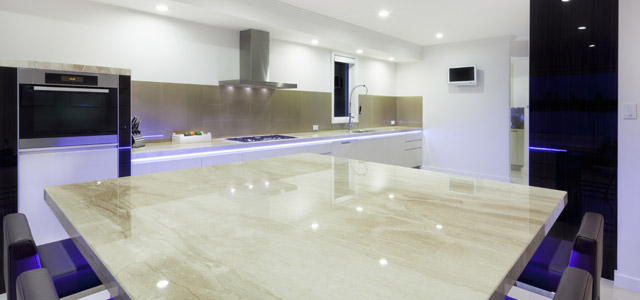Engineered quartz is a stunning man made material used in homes across the country. It is perfectly suited for kitchen and bathroom countertops due to its resilience and charm. When remodeling, homeowners should consider installing engineered quartz to add beauty and value to their homes. Aside from its aesthetic appeal, one of the biggest perks to engineered quartz is how easy the material is to maintain. There are still a few cleaning tips you should keep in mind in order to prolong the lifespan of your stunning kitchen or bathroom counter.
Cleaning Up Spills
Despite best efforts, spills often happen. Installing quartz countertops can reduce the amount of work you need to do should a spill occur. You can easily clean up spills with a vinegar-water solution and a non-abrasive cleaning cloth. Most manufacturers recommend using a microfiber cloth for this purpose. If you are uncertain, you can always contact the retailer or manufacturer for clearer instructions.
If you spill something that tends to harden as it dries, like gum or grease, be sure you use a plastic scraper to remove the residue. Metal will scratch the surface of the quartz, but plastic will remove the material without damaging your countertop.
Permanent Markers Or Dies
In some cases, your counter may come into contact with permanent markers, dyes, or certain solvents. This can happen more often than one would think in homes with young children or those who are avid crafters. Unfortunately, these materials can cause your counter to become permanently discolored. If you work with these materials often, you may want to designate another space in the house for clean up.
If an accident happens, you may still be able to save your counter if you catch it quickly enough. Wipe up the stain immediately with an absorptive but non-abrasive cloth. Rinse the area off with a lot of water. Never use harsh or abrasive cleaning products. You can always contact the retailer or manufacturer for guidance if a stain does occur.
Remember That Quartz Is Not Heat Proof
Quartz is a beautiful stone that looks incredibly resilient. It does resist stains quite well, and can hold up to the test of time. However, it is not heat proof. Placing hot items directly on the quartz itself will cause irreparable damage to the surface. Always use hot pads, trivets, or other protective items to prevent your countertops from becoming damaged.
Always Use A Cutting Board
Quartz is one of the strongest materials available and countertops made with quartz can often withstand a lot of damage. It holds up particularly well against cuts and scratches. This makes it incredibly attractive to most homeowners, especially those who cook often.
Most manufacturers and retailers will still advice that you use a cutting board instead of the surface itself. This ensures that your countertop will last longer. It will also prevent your knives from becoming dulled prematurely. Be sure you use a thick wood or plastic board to guarantee protection.
Grease Stains
Grease can stain a countertop in one of many ways. If you are dealing with splash back from stovetop cooking, you should wait for it to cool before trying to remove. This makes it easier to get the grease off without spreading it around. It is also a lot safer to take this approach. Use a degreasing agent, like the one found in your dish soap, and a plastic scrapping tool. Apply the degreaser to the area and then gently scrape off with the plastic tool. This should remove all the grease without causing it to spread.
Everyday Maintenance
You should wipe down your counters at least once a day to prolong their life. This is a good time to inspect them for signs of damage. Catching a scratch or dent when it happens can prevent it from becoming worse. You do not need to invest in anything expensive to keep your counters clean. Most homeowners use a solution made with dish soap and warm water. Be sure that you use a non-abrasive sponge, to further protect the surface of your counters.


